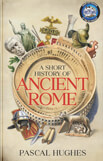Noiser
Muhammad Ali: The Greatest
Play Short History Of... Muhammad Ali
Muhammad Ali was more than just a boxing champion—he was a global icon who left a lasting legacy through his athletic achievements and bold social and political stances. He rose from humble beginnings to become a three-time world heavyweight champion, an Olympic gold medalist, and a transformative figure in American history.

Early Life
Cassius Marcellus Clay Junior was born on January 17th, 1942, in Louisville, Kentucky. Clay was introduced to boxing at the age of 12 after his bicycle was stolen. Determined to "whup" the thief, he began training under police officer and boxing coach Joe Martin. By the time he was 18, Clay had compiled an impressive amateur record and earned a spot on the 1960 U.S. Olympic team. He won the light heavyweight gold medal in Rome, launching his international boxing career.

Ali was so happy, so proud of himself. He had that gold medal around his neck, and he was not taking it off. When he got back, he was walking around the streets of Manhattan, stopping people on the street and saying: “Do you know who I am?”
Jonathan Eig, author of the award-winning biography Ali: A Life
Becoming Muhammad Ali
In 1964, at the age of 22, Clay faced Sonny Liston for the heavyweight title. Considered the underdog, Clay shocked the world with his elegant footwork and incredibly fast punches, defeating Liston by technical knockout. Soon after his victory, Clay announced he had joined the Nation of Islam and changed his name to Muhammad Ali. The name change marked the beginning of a new chapter in his life, not just as a boxer, but as a political and religious figure.
Ali’s association with the Nation of Islam and his rejection of his "slave name" sparked controversy. Many in the mainstream media continued to refer to him as Cassius Clay for years. Ali remained unapologetic, stating that he was reclaiming his identity and standing up for his beliefs as a Black man in America.
Vietnam
Perhaps the most defining moment in Ali’s life came in 1967, at the height of the Vietnam War. Citing religious and moral objections, Ali refused the U.S. Army’s draft.
“Man, I ain’t got no quarrel with them Viet Cong,” he famously said. As a result, he was stripped of his heavyweight title, banned from boxing for three years, and faced a five-year prison sentence.
Ali appealed, and eventually the U.S. Supreme Court overturned his sentence. Although he lost prime years of his boxing career, his refusal to be drafted turned him into a symbol of resistance and civil rights. He became a hero to those who opposed the war and those fighting for racial justice.
Return to the Ring
Ali’s comeback included some of the most legendary bouts in boxing history. In 1971, he fought Joe Frazier in Madison Square Garden, New York, in what was dubbed "The Fight of the Century." Although Ali lost by unanimous decision, the fight began a fierce rivalry that would span three bouts.

In 1974, Ali faced George Foreman in Zaire (now the Democratic Republic of Congo) in a fight known as the “Rumble in the Jungle.” Foreman was a formidable, undefeated champion known for his powerful punches. Ali employed a now-famous strategy called the “rope-a-dope,” absorbing punishment on the ropes before launching a counterattack that knocked an exhausted Foreman out in the eighth round. It was one of the greatest upsets in boxing history and marked Ali’s return to the top of the sport.

Ali’s third and final bout against Frazier, the 1975 “Thrilla in Manila,” was an epic contest fought in sweltering heat. Ali won when Frazier’s corner stopped the fight after the 14th round.
The fight nearly killed both of them. It was brutally hot, and it went almost to the finish before, finally, Frazier's corner threw in the towel. Ali said afterwards that it was the closest to death he'd ever felt. After that fight, neither of them was ever the same.
Jonathan Eig, author of the award-winning biography Ali: A Life
The Final Rounds
Ali’s last fight was in December 1981, when he was 39 years old. In his career, he achieved 56 wins—37 by knockout—and five losses.
In 1984, Ali was diagnosed with Parkinson’s disease, a neurological condition likely linked to the head trauma sustained during his boxing career. It’s estimated he took over 200,000 punches in his lifetime. Despite his declining health, Ali remained active in public life, advocating for humanitarian causes, promoting peace, and even travelling to war-torn countries to negotiate the release of hostages.
One of his most memorable public appearances came during the 1996 Olympic Games in Atlanta, where he lit the Olympic cauldron despite the visible effects of Parkinson’s. It was a powerful moment that showcased his enduring spirit and the universal respect he had earned.
Legacy and Impact
Muhammad Ali passed away on June 3rd, 2016, at 74. His death was mourned around the world. Up to a hundred thousand people lined the streets of Louisville to say goodbye to the city’s most famous son. His pallbearers included the legendary boxers Lennox Lewis and Mike Tyson, as well as Will Smith, who portrayed Ali in the 2001 film.
Ali was a great boxer, but not the greatest. I think what matters about him most is that he was a great boxer who used his talents in the ring to see what he could do outside the ring, to see how much he could push us to be a better society and to fight for the things that mattered to him.
Jonathan Eig, author of the award-winning biography Ali: A Life.
